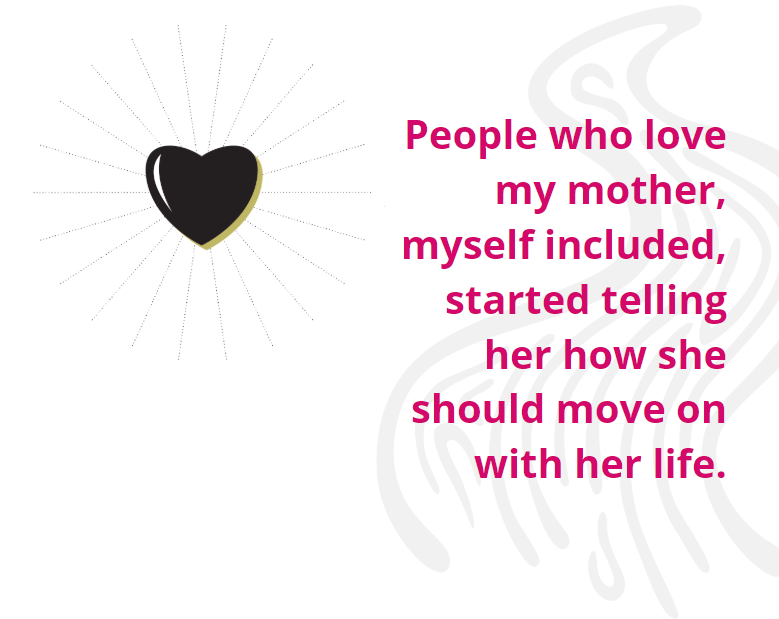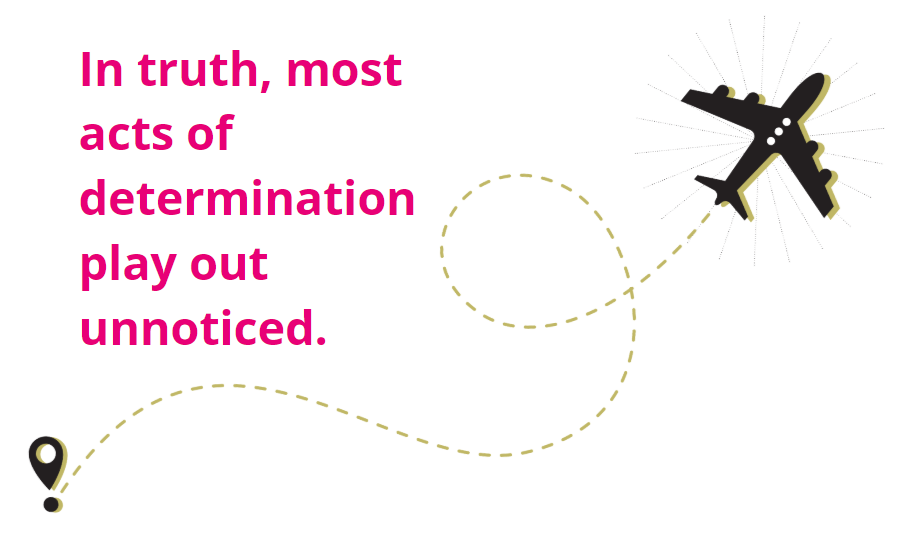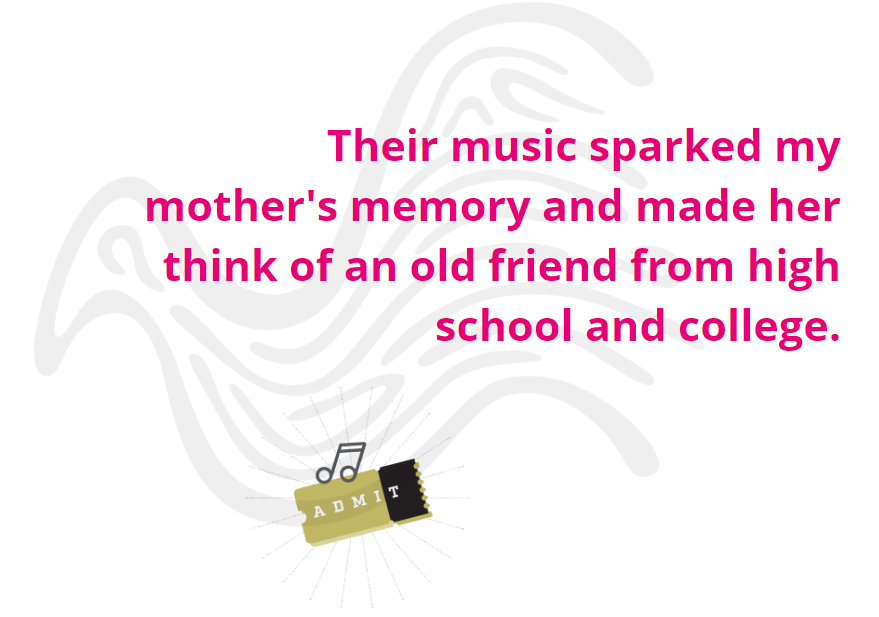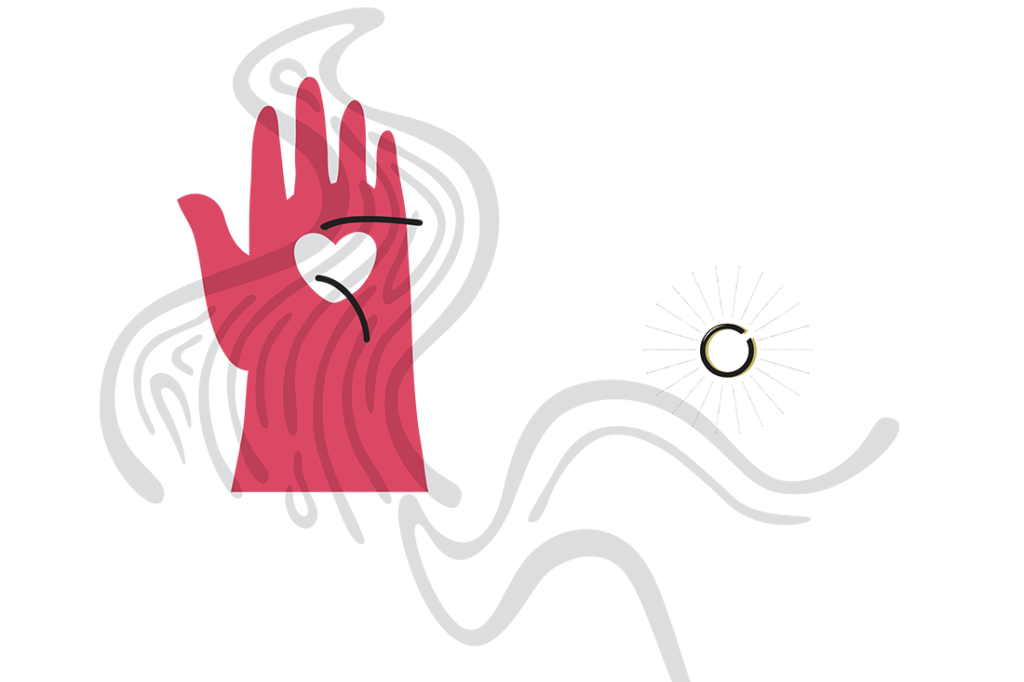Six hours before my father died, my mother pulled a broken wedding band from her pocket and slid it onto his left ring finger.
My brother and I were witnesses. The bride kissed his warm forehead, and he strained through a heavy breath.
She’d kept the ring since the summer of 2017, when doctors cut it off before one of his heart surgeries. He wanted to die after that one, I remember clearly, because in the post-operation pain he shouted, “Mike, give me a —-ing gun,” over and over. Doctors eventually calmed him down, and Mom and I stopped on the way home for pizza in a strip mall. It was after 10 p.m. and a sign said the place was closed, but they made us a large supreme anyway. I left a big tip and a note on the receipt for the waiter: “I know you wanted to go home, but your food and fellowship provided comfort to weary souls.”
Mom still talks about how good that pizza was.
Dad hung on for another year and a half, entirely because of her. By the time the heavy breaths softened and stopped in the early evening of January 11 of this year, she’d been taking care of him, every day, mostly by herself, for about eight years. Strokes started it all, then came the falls from the loss of balance that came from the strokes, then the permanent wheelchair that came after the falls. Her life became a routine of blue rubber gloves and bathroom trips and in-home nurse visits, and when he finally drifted off for an evening nap each day, she’d sneak in a Miller Lite or Mike’s Hard Lemonade for herself.
I don’t know what makes some people better caretakers than others, but I know my mother should be in the hall of fame.
She was just 18 when she had to help care for her two younger siblings after their mother died in 1969. She earned a bachelor’s degree from the University of Maryland while raising them. She moved to southern Maryland to teach first-graders in the mid-1970s, met my father, married him, and a year later I was born. She spoiled me and my brother, Kenny, rotten through college. A couple of years after Kenny moved out for good, Dad started suffering occasional mini-strokes. A couple of years after that, she retired from teaching after 40 years to nurse him until.
If you add up the years, my mother had spent nearly a half-century as a caretaker to her family and other people’s kids when she slipped that ring on our father’s finger that January day. The next morning, the only person she’d have to care for would be herself.
How, we all wondered, would she handle that?
* * *
In some cultures, people observe 40-day mourning periods. In others, 30. Jewish tradition calls for shiva, or seven days of visits from mourners following a burial.

People who love my mother, myself included, started telling her how she should move on with her life within the first 48 hours. Some even used the word “freedom,” and if you take nothing else from this essay, please take this: Don’t use the word “freedom” to try to help someone who’s mourning. No matter how tough his health issues, my father brought life to our family—humor, courage, character—and who would want to be free of those things?
What we meant, of course, was that we saw in my mother a healthy 67-year-old woman who could finally arrange her life however she wanted.
“You can just go to Charleston for a few days,” I told her, “and not worry about anything.”
Countless times in the decade that preceded Dad’s death, she’d call me and ask for my advice on some of the most difficult questions a spouse can face. Should we take the hospice company up on its offer for palliative care? Does that mean we’re giving up? What about the doctors who said they can’t operate on his heart anymore? Should we seek more opinions? What should we do when Medicare won’t cover another extended visit? Should we move him into a nursing home? How would we afford it? He fell again; what now?
Her agony wiggled through the phones and into my stomach, and often I immediately made the four-hour drive from Charlotte to check on her.
Silly me, I figured she’d still need me to send her answers after he was gone.
I once worked with a person who signed every email with “carpe diem.” It made me uneasy. What pressure we place on ourselves, I thought, with this obsession to seize days. Isn’t there value in letting some just slip on by?
Yet here I was, along with everybody else, trying to fill up my mother’s schedule. Her friends called with offers to visit and summer beach trip suggestions. Neighbors told her of gatherings she could attend. Other family members suggested volunteer work. It feels good to give back, they said.
We all want to be fixers, I suppose, but in the weeks after my father’s death all my mother heard were ways to make noise when she wanted to be silent. Maybe it’s a product of hundreds of years of capitalism, but in modern America there is no time off, and silence is so disarming it can seem like a regressive stance.
Of the many worthwhile Jim Rohn quotes that have filled SUCCESS magazine’s pages over the years, one stands out: “How long should you try? Until.”
Usually when I see quotes like that, or see someone speaking about the importance of determination, the anecdote involves something major, and often physical: The U.S. Women’s Soccer team was determined to win the World Cup; Brett Favre was determined to throw four touchdowns the day his father died; a person born into poverty was determined to make it out and become a successful doctor.

In truth, most acts of determination play out unnoticed. While working on this essay the other day, I spent a few hours writing in a coffee shop and restaurant near my home called the Community Matters Café. The shop is managed by the Charlotte Rescue Mission, which provides residence and programs to people recovering from addiction. From the baristas to the cooks, the staff is made up of people going through recovery.
The restaurant has one of those chalkboards where people fill in the blank. The prompt is: “Today I will …” Responses on the day I was there included a few single words—“hope,” “forgive”—a few spiritual messages—“surrender to God’s will” —and one mission to “not light a corndog on fire.”
Each will require its own kind of willpower.
In the case of my mother, her strength shined when she finally told us to shut up.
I received the message a few weeks after Dad’s memorial service, when I called to check in and brainstorm. She interrupted and said, “I just don’t need any more people telling me what I should be doing.”
Of course, I thought.
Let the days slip on by.
* * *
She went to Ireland first.
Carpe diem.
Two months and two weeks after Dad passed, Mom drove from the house they shared on the coast to mine in Charlotte. There, she’d take a plane to Ohio and meet her older sister, who booked the trip and who will hate to read that I wrote she’s the “older sister.” From Ohio they’d fly to D.C., and from D.C. they’d make a connection to Galway.
The Charlotte airport is about 15 minutes from my house. My mother insisted I drop her off more than three hours early, just to be safe. She’d never been out of the country, but she’d secured a passport sometime last fall without telling us. (Here would be a good spot for a finger-on-the-chin “Hmm” emoji.)
She checked her purse for that passport at least a hundred times in the 15-mile drive to the airport.
Even though she’d only flown a couple of times in her life, my mother had been places. She was born in California, the middle of five children. Her given name is Patrice, but her family called her Tricey (pronounced tree-see). Her grandfather was an Episcopalian preacher, and her father fought in the Pacific in World War II. He came home and worked in retail after that, but he was more famous in our family for his temper and hard-headedness. They moved to Spokane, Washington, when mom was still a young girl, and then to Wheeling, West Virginia, when she was in high school. Soon, my grandfather landed a job just outside of Washington, and the family moved to Silver Spring, Maryland.
On Halloween night 1969, my grandmother was coming home from the grocery store and a group of teenage boys surrounded her. When she refused to surrender her purse, or the $20 bill she had in it, they picked her up and dropped her. Her head slammed on the concrete and she survived nearly a month before dying on Thanksgiving Day.
My mother turned 18 that week.
Tricey’s older sister (sorry again, Janet!) was out of the house by then, meaning my mother had the charge of raising the younger kids. She did that, and still caught the bus to the University of Maryland every day. She graduated during some glory years for Maryland’s basketball team, with Lefty Driesell as coach and Lenny Elmore and Tom McMillan on the team. She was a steady bookworm, though, and earned her teaching degree in 1974.
During the same stretch of years, the late 1960s and early ’70s, my father, on the other hand, was jumping out of planes on a sport parachuting team. He was seven years older than Mom, and when they met, she was probably twice his age in maturity. Their introduction was a minor scandal: He was dating her roommate when their relationship began. I’m fairly certain it’s the last time my mother—the tattoo-despising, first-grader-teaching, shoot-and-darn-saying woman who raised me—ever broke a rule, unwritten or otherwise.
That’s the woman I drove to the airport this spring. As we pulled up to the terminal for the big Ireland trip, I suggested that the easiest thing would be for me to drop her off at the gate.
She didn’t say anything.
“Do you want me to walk in with you?” I asked.
“Well yeah,” she said. “That’d be nice.”
I parked and walked her through the ticket line. We hugged and I watched her navigate security. When she turned the corner and out of sight, I swallowed a hard lump.
* * *
My father’s best move on my mother was to do work for her. She’d moved into her own place after they started dating, and one day she mentioned casually that she wished for fresh paint on the walls.
The next day she came home and my father was cleaning off brushes.
He was a fisherman and she was a teacher, and they worked like that. They argued some nights, went on dates at the Chinese restaurant other nights. She grounded him, and he told her it was OK to cuss. He named a charter boat after her, the Tricey Anne, and she cut up cantaloupe for Sunday cruises around the Chesapeake.
When I was 8 or so, at the urging of doctors and his own mother, my father quit drinking for good. I have a vague recollection of one night at the St. Mary’s County, Maryland, fairgrounds. My mother and I were on the Ferris wheel when we rolled over the top and looked down to see him standing there in a blue T-shirt, holding a Miller Lite in the air.
“What’s he doing with that?” my mother said.
Nothing, it turns out. He’d bought it for her.
In later years, when he couldn’t do anything for her, he showed it in other ways. Each December 24, he’d panic about Christmas presents. I remember Christmas Eve 2014, their last as residents of Maryland before moving to North Carolina, I took him to a Target store back home. He was using a walker then, but not for long distances. We scored one of those motorized wheelchairs and went around the store while he frantically searched for the perfect stocking stuffers.
“Let’s go to the books,” he said.
“Is there one she wants?” I asked.
“I don’t know,” he said. “It’s just the first thing that came to mind.”
After they moved South, he got his own motorized scooter to take around the neighborhood. That first December in the new place, he asked my mother to help him to the scooter, and then he took it down the street to their neighbors’ house to ask them to pick up a Christmas gift for her. He didn’t carry a wallet by then, but he assured them he’d pay them back.
The neighbor called my mother, not sure what to do. Mom told her not to worry about the gifts; with his memory battered by strokes, he’d forget.
He didn’t, though. When Kenny and I arrived at their house for that first holiday in their new home, the first thing that came out of his mouth was, “Alright, boys. Let’s go get your mother some presents.”
That’s how our last Christmas tradition as a family came to be: All of us, my mother included, walking around the Belk store, looking to fill the tree apron with gifts that read:
To: Patrice
From: Fred
* * *
When I walked back to my car after dropping Mom off at the airport, I remembered the time they left me at the luau.
It was my first weekend of college in 1997, and the roommate I’d talked to all summer decided at the last minute that he didn’t want to live with me. Nothing personal, he said, but he wanted to room with his high school best friend, who happened to live one floor above us. The college would approve the swap, he said, with my blessing. I agreed to move later that week, and then he and his buddy went out to celebrate while I walked the new campus alone, 300 or so miles from home.
The orientation team had a cheesy luau planned, right there in the middle of North Carolina, where there is no ocean. I’d just poured a glass of punch when I saw my parents walking up. They’d come to say goodbye (in actuality: check on me) before leaving the next morning. We have never been big on sharing or talking about feelings in our family, but we always show up.
Standing in that crowd of freshmen, I was at once comforted and embarrassed by their presence. I remember my father said, “You gonna be alright?” like he always did, and I remember Mom hugged me and walked away.
Three weeks later, a guy down the new hall said he was going home for the weekend. He lived close to where I grew up and offered a ride. I called to tell my parents I’d see them that night. Dad’s answer stunned me.
“Why?”
In some ways, the past six months with my mother have felt like sending her off to college. I avoided texting or calling her on her first trip overseas, but my heart sped up when I saw her come down the escalator to baggage claim wearing her “Ireland” shirt a week later.
We talked two or three times a week in the last few years of my father’s life. Over the past six months, we’ve slowed to about once a week. I don’t ask questions. I don’t make suggestions, not because I don’t care, but because I do.
* * *
One day in early July, my phone rang.
She was returning my call.

We talked about the storms that had passed through where she lived. She asked about my wife, Laura, and our never-ending kitchen renovation. We talked about some things and about nothing, until she finally arrived at the subject she really wanted to bring up.
She’d been watching a Sunday morning program, and one of the feature stories was on the band America. You know their work, even if you don’t think you do. They sing “A Horse with No Name.”
Their music sparked my mother’s memory and made her think of an old friend. They’d reunited online in recent years and met at least once in person; the friend lives in Charleston, about three hours down the coast from my mother’s place. They got to talking, and talking, and talking. At some point during their conversation I’d called, and my mother ignored it.
Kids, right?
During all that talking, she and her friend googled America and saw that they were on tour. And wouldn’t you know, she said, they have an upcoming stop in Charlotte, at an arena about a mile and a half from my house? And would you believe, said my mother, the careful planner who once spent her Sundays sorting my father’s medicine for the week into little plastic cups, that they’d up and bought tickets for that concert? Just on a whim.
I’m so proud of her.
This article originally appeared in the November/December 2019 issue of SUCCESS magazine.











